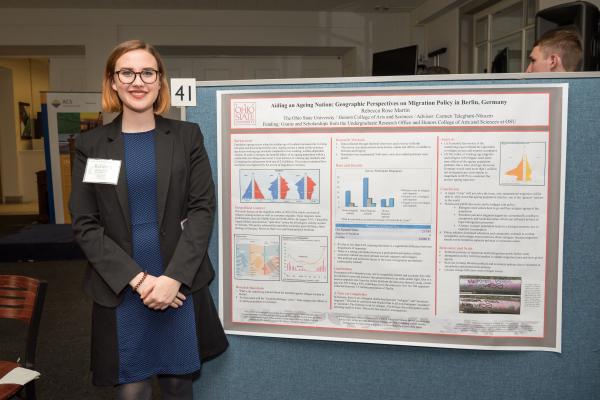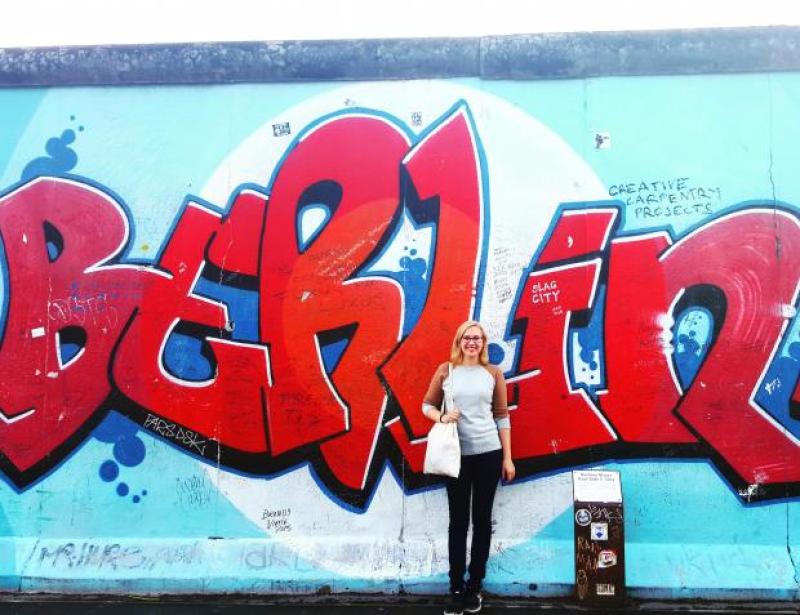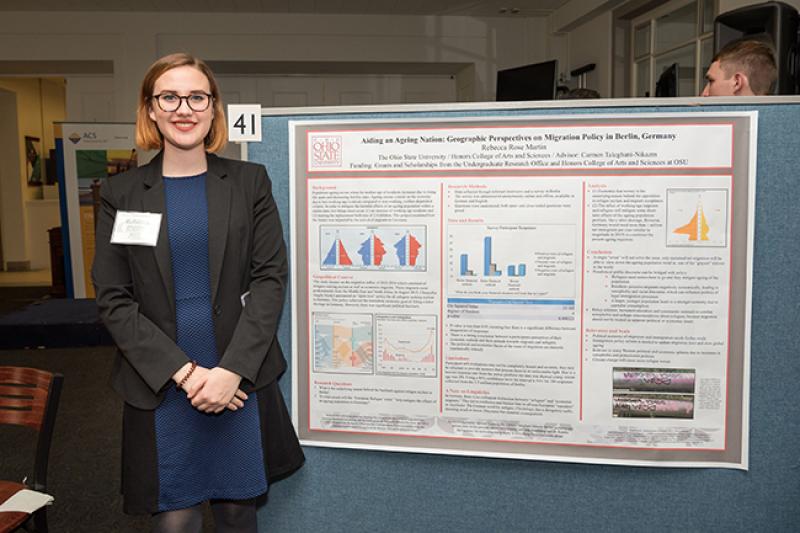Young alum found her place in international studies and geography

When recent graduate Rebecca Rose Martin first came to Ohio State, she knew she wanted to do research, but needed a little time to decide on a major. After trying biology and engineering, she eventually found her place in the Departments of Geography and International Studies.
“Originally, I had no idea what I wanted to do,” Martin said. “Luckily, I was at Ohio State where there’s an enormous number of majors. I eventually found exactly what was right for me.”
Martin cites the individualized instruction she received in her honors seminar class with switching on her critical thinking skills and igniting her interest in studying international development. After declaring an international studies major, she began shopping around for another major that fulfilled her academic and career goals.
I was searching for a really long time before I found geography,” Martin explained. “But as soon as I started reading the class names in the major, I was like, ‘This is for me.’”

Inspiration Strikes in Berlin
After a study abroad trip aimed at first-time travelers sparked her interest in Germany, Martin designed a research project with advisor Carmen Taleghani-Nikazm, associate professor in the Department of Germanic Languages and Literatures, to measure Berlin residents’ opinions on immigration.
“My research journey really started when I was studying abroad,” Martin said. “Germany had just instituted an open-door asylum policy, which was very polarizing.”
Martin remembers seeing welcome marches for migrants, followed by fearmongering tactics within the public discourse in Berlin.
Once she had her topic in mind, Martin moved forward with conducting preliminary research and applying for funding and institutional review board approval. She said she hoped to receive at least enough financial support to pay for the flight to Europe. Martin was shocked when she received enough funding from the Office of Undergraduate Research and the University Honors Program to support her expenses in Germany for four months while she did her research.
During those four months, Martin surveyed Berliners to gauge their opinions on the recent swell of migrants to their city.
Martin hypothesized that opinions on immigration would correspond closely with age, but ultimately found that “nothing is black and white.” While opinions on immigration did follow some demographic lines, the most noteworthy correlation showed that individuals with feelings of economic uncertainty about their own futures tended to have a more negative view of immigrants.

Martin presents her research on Capitol Hill as part of the Council on Undergraduate Research’s 2018 “Posters on the Hill” event.
From Berlin to D.C.
Martin explained she wanted to conduct her surveys in Berlin specifically because of the city’s strong cultural identity and the prevailing negative idea of “the outsider” that many Berliners hold. Although her research was conducted abroad, Martin sees many parallels for Americans, as the nation grapples with a tense public discourse surrounding immigration.
Martin’s biggest takeaway from her research is that education and community outreach are the best ways to increase acceptance of immigrants.
“In the U.S. specifically, I think it’s important to dispel the misconception that immigrants are somehow bad for the economy or going to make your specific situation worse,” Martin said. “Because all of the literature, at least in my field, is at a complete consensus that immigrants are good for the economy.”
Martin had the opportunity to present her findings to congressional leaders at the 2018 Council on Undergraduate Research’s “Posters on the Hill” event in Washington, D.C. Martin, along with undergraduate researchers from around the country, lobbied representatives and educated them on her findings.
Going Forward
For now, Martin wants to take the skills she acquired at Ohio State and enter the workforce, focusing on public service or policy research. She does want to return to school eventually to obtain a graduate degree and continue conducting research.
“I’ve always imagined myself becoming a specialist in my field,” she explained. “In order to achieve that, I think going to grad school and getting my master’s degree is the first step.”
For undergraduates considering embarking on a research project of their own, Martin recommends honing in on just one question to answer so that the project doesn’t become too overwhelming.
“I think a lot of people get caught up in the idea that they need to have this huge takeaway at the end that is going to change the world,” she said. “But you don’t need to discover electricity to have a good research project. The idea is to add to the literature in whatever way you can.”
